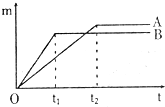问题
填空题
将质量相等的A、B两块金属,分别放人溶质质量分数相同的足量稀盐酸中,生成氢气的质量(m)与反应时间(t)的关系如下图所示(产物A、B两种元素的化合价相同),分析下图,填空(“>”或“<”)
(1)金属活动性A______B.
(2)相对原子质量A______B.

答案
从坐标中可以看出,横坐标表示时间,纵坐标表示氢气的质量,则斜率的大小表示反应的速度,B的斜率大,则B的反应速度快,故B比A活泼,价态相同的金属与足量的酸反应,相对原子质量大的产生氢气的质量小,从坐标中可以看出,B产生的氢气少,故B的相对原子质量大.
故答案为:<;<;
